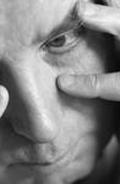Useful information about sexual problems
|
|
Sexual desire disorders or decreased libido can be caused by a decrease in normal estrogen (in women) or testosterone (in both men and women) production. Other causes may be aging, fatigue, pregnancy, medications (such as the SSRIs) or psychiatric conditions, such as depression and anxiety. For both men and women, these conditions can manifest as an aversion to, and avoidance of, sexual contact with a partner. In men, there may be partial or complete failure to attain or maintain an erection, or a lack of sexual excitement and pleasure in sexual activity. Orgasm disorders are a persistent delay or absence of orgasm following a normal sexual excitement phase. The disorder can occur in both women and men. Again, the SSRI antidepressants are frequent culprits -- these can delay the achievement of orgasm or eliminate it entirely. It is unclear exactly what causes vaginismus, but it is thought that past sexual trauma (such as rape or abuse) may play a role. Another female sexual pain disorder is called vulvodynia or vulvar vestibulitis. In this condition, women experience burning pain during sex which seems to be related to problems with the skin in the vulvar and vaginal areas. The cause is unknown. Sexual dysfunctions are more common in the early adult years, with the majority of people seeking care for such conditions during their late twenties through thirties. The incidence increases again in the geriatric population, typically with gradual onset of symptoms that are associated most commonly with medical causes of sexual dysfunction. An erection occurs when the nervous system activates a rapid increase in blood flow. The vascular muscle in the spongy area becomes engorged with blood and the outflow of blood is cut off. An erection can occur as a reflex as we see in spinal cord patients, or can be caused by psychogenic (originating in the mind) stimulation. Numerous sexual stimuli are processed by the brain and transmitted to the penis via the nervous system. In order to increase the size of an erection, there must be an increase in blood flow and, at the same time, the blood has to be prevented from leaving the penis. Because erections are caused by the buildup of blood in the shaft of the penis, poor blood flow in the penis can result in problems with erections. Damage to blood vessels can be caused by hardening of the arteries (atherosclerosis) or from trauma. Vascular disease is believed to be the most common medical cause of erectile dysfunction. Nerves must be working normally for a man to get and keep an erection. Nerve damage can result from diabetes, multiple sclerosis, prostate surgery or damage to the spinal cord. Psychological issues such as depression, anxiety, guilt or fear can sometimes cause sexual problems. At one time, these factors were thought to be the major cause of erectile dysfunction. Doctors now know that physical factors are present in most men with erectile dysfunction. However, embarrassment or "performance anxiety" can make a physical problem worse. Erectile dysfunction caused only by psychological causes is found most commonly in young men. Abnormal levels of certain hormones, such as testosterone, thyroid hormone and a pituitary hormone known as prolactin, can interfere with erections and sex drive (libido). This is an uncommon cause of erectile dysfunction. A man with erectile dysfunction has either a problem getting an erection or difficulty maintaining one. This usually interferes with sexual activity by preventing penetration during intercourse. Erectile dysfunction can occur suddenly or gradually. Some men slowly lose the firmness of their erections or how long the erections last. In other men, especially those whose impotence is largely caused by psychological factors, the problem may occur unpredictably and can improve at any time. Despite their difficulties with erections, men with impotence often continue to have normal orgasm and ejaculation. How long your erectile dysfunction lasts depends upon what causes it and how quickly your treatment starts to work. The important thing to remember is that erectile dysfunction is treatable in all age groups. Little is known about how to prevent erectile dysfunction. However, avoiding cigarette smoking and maintaining normal blood pressure and cholesterol levels can help because smoking and high cholesterol can affect blood vessels. Men with diabetes should strive to keep blood sugar levels under control. Because certain medications have been associated with erectile dysfunction, ask your doctor about possible side effects before you start using any new prescription.
Definitions and termsImpotence Antihypertensives Why not go to the site about Love now?
|

